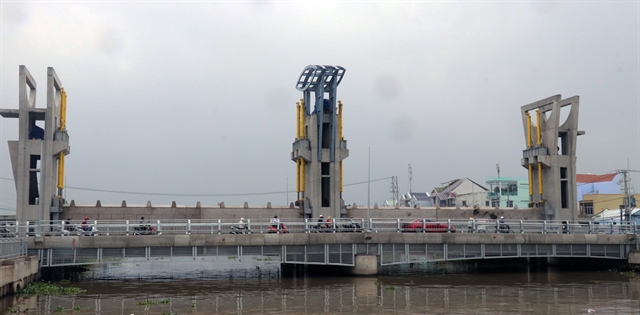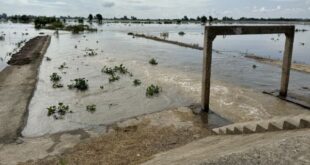
HCM CITY — The Cửu Long (Mekong) Delta provinces say they have taken effective measures to mitigate saltwater intrusion impacts in the ongoing dry season.
This has helped ensure fresh water for agriculture production and household use in coastal areas.
The delta, which comprises 12 provinces and Cần Thơ City, is normally affected by saltwater intrusion from the sea during the dry season which lasts from December to April.
To mitigate the impact of saltwater intrusion, local authorities in the delta have proactively implemented saltwater prevention projects and properly operated irrigation works at the beginning of the dry season.
These measures have helped the delta, the country’s largest producer of rice, fruit and seafood, to protect the 2021 – 22 winter-spring rice crop and other crops from the impacts of saltwater intrusion, local authorities say.
Lê Hữu Toàn, deputy director of Kiên Giang Province’s Department of Agriculture and Rural Development, said: “The province has not recorded any agricultural production damage caused by saltwater intrusion so far this year.”
The province’s An Minh, An Biên, Kiên Lương and Châu Thành districts, which are normally hardest hit by saltwater intrusion, had built or upgraded a total of 43 saltwater prevention sluices to protect their crops and livestock.
Stable and sufficient supply had been maintained for water treatment plants and supply stations in the province, he said.
The province’s Irrigation Sub-department had effectively operated more than 100 sluices to prevent saltwater intrusion and store water for agricultural production, he added.
It closed the Cái Lớn – Cái Bé irrigation system, the delta’s largest one, at the end of last month in order to secure fresh water for surrounding localities.
With saltwater expected to encroach deep into rivers and canals in the province between now and the middle of March, the peak dry season period, Kiên Giang, the delta’s largest rice grower, has advocated that farmers regularly check embankments and sluices to prevent salination of rice fields.
Locals have also been advised to check water salinity before pumping it into rice fields and to use fresh water efficiently.
Less severe
Saltwater intrusion in the delta is forecast to be less severe than last season.
In coastal areas, water with a salinity content of four grams per litre is estimated to enter 50-65 kilometres deep into river mouths in February and March, 15-25 kilometres less than the same period last year.
Most crops can only tolerate water with a salinity rate of less than one gram per litre.
In Tiền Giang Province, the delta’s largest fruit grower, salt water has entered 53 km deep into the Tiền River, a tributary of the Mekong River.
The building of a dam on the Nguyễn Tấn Thành Canal in Tiền Giang has prevented saltwater intrusion, protected agricultural production and secured fresh water for household use in Tiền Giang and Long An provinces, local officials say.
The Tiền Giang Department of Agriculture and Rural Development has been implementing various projects to prevent drought and saltwater intrusion and to secure irrigation water for 83,000ha of fruits, 49,000ha of rice and 26,000ha of vegetables.
Phạm Văn Trọng, deputy chairman of the Tiền Giang People’s Committee, said the province was effectively operating irrigation works to serve agriculture production and was prepared to take fresh water from wells to supply saltwater affected areas.
In Sóc Trăng Province, farmers in Long Phú and Trần Đề districts have harvested all 40,000ha of the 2021-22 winter-spring rice without being affected by saltwater intrusion.
Farmers in the province’s saltwater prone areas are also getting sufficient irrigation water for their crops because of the effective operation of saltwater prevention projects, local reports say.
Nguyễn Thị Thuỳ of Trần Đề District said her family grew watermelon during this season and would harvest the fruit soon.
“This year we have got enough irrigation water, so my family’s watermelon crop has grown well,” she said.
Phạm Tấn Đạo, head of the province’s Irrigation Sub-department, said farmers had been instructed to take proactive measures to avoid saltwater intrusion that would affect their crops.
The sub-department was working with localities to operate saltwater prevention sluices properly in order to help farmers mitigate the impacts of saltwater intrusion, he said.
It was also working with the province’s Centre for Hydro-Meteorology Forecasting to monitor water salinity and disseminate results on mass media and via email and SMS to the public so they could take in irrigation water when its salinity rate is low, he said. — VnExpress News
- Reduce Hair Loss with PURA D’OR Gold Label Shampoo
- Castor Oil Has Made a “Huge” Difference With Hair and Brow Growth
- Excessive hair loss in men: Signs of illness that cannot be subjective
- Dịch Vụ SEO Website ở Los Angeles, CA: đưa trang web doanh nghiệp bạn lên top Google
- Nails Salon Sierra Madre
 VnExpress News The News Gateway of Vietnam
VnExpress News The News Gateway of Vietnam





